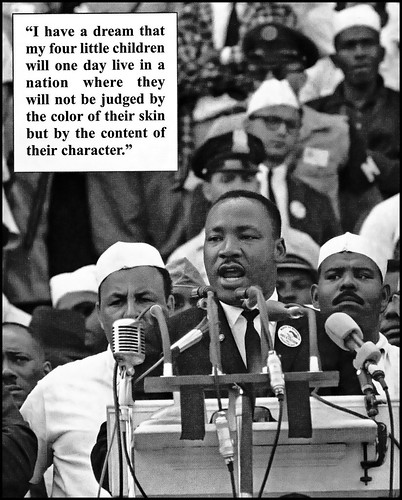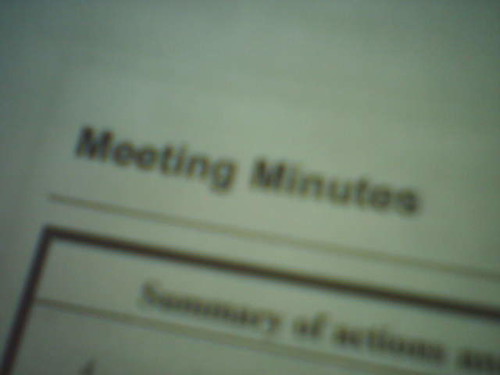13th Sunday in Ordinary Time (C)
Picture: cc Tony Fischer
I have a dream… I have a dream…
Sisters and brothers, I think at least some of us will recognise these words from that famous speech delivered in 1963 by the late leader of the American Civil Rights Movement, Rev. Martin Luther King, Jr. In this speech, Rev. King was speaking of his hope–his dream–that all people, especially all those of his own Negro race, would one day enjoy freedom. Freedom from discrimination. Freedom from oppression. Rev. King’s dream was of a future in which all Americans would be treated equally, regardless of the colour of their skin.
Sisters and brothers, to be honest, I too have a dream. I too dream of freedom. But, sad to say, the freedom that I sometimes dream about is far less noble, far less honourable, far less selfless than Rev. King’s. I’ve had this dream for some time now. Though I can’t quite remember when it began. I’m not always aware of it. It seems to make its presence felt especially when things aren’t going so well for me. The shape of this dream has been shifting with the passing of the years. But, at its core, it has always remained the same dream.
As a child, for example, I sometimes found myself dreaming of a day when I would no longer have a naggy grownup breathing down my neck. Insisting that I take a bath when I didn’t want to. Or refusing to let me out of the house when I wanted to join the neighbourhood kids in their games. As a student, I dreamt of finally being free from the burden of mathematics exams and physics tutorials. In the army, I dreamt of no longer having to report to camp at some unearthly hour. Of no longer having to spend those seemingly senseless nights performing guard-duty. Trying to keep people out of a place where nobody really wanted to go anyway. At work, I dreamt of not having deadlines to meet, or a boss to answer to. And, to be honest, now that I’m a religious, there are days when I dream–dare I say it–of being free from one or other of my confreres in community. Or even from my superior.
In other words, what I dream of from time to time is not so much to be liberated from the burden of discrimination, as to be freed from the yoke of responsibility and accountability. My dream is to live the life of a free agent. One who can do whatever he wishes. One who is tied down by nothing. Answerable to no one. And aren’t there people who seem to already be living this kind of life today? Aren’t there people who seem rich enough and unattached enough to be burdened by no worries at all? To be able to do whatever they want?
To use an image from our readings today, my dream is to no longer have a field to plough. Of course, unlike Elisha, I’ve never actually ploughed behind an ox before. Let alone twelve. But I can imagine what a backbreaking job it must be. So there is a part of me that doesn’t quite understand the hesitation on the part of Elisha in the first reading. And also of those people in the gospel, who ask to follow Jesus. Jesus seems to be offering to take them away from it all. To set them free from all the burdens of life. Isn’t this the answer to all their prayers? To finally be liberated from the tiresome grind of their daily responsibilities? Why hesitate?
Thankfully, Saint Paul comes to my rescue. In the second reading, he clarifies for me the true meaning of freedom. You were called to liberty, he says, but be careful or this liberty will provide an opening for self-indulgence. St. Paul is drawing a distinction here between liberty and license. Between freedom and self-indulgence. And, not only that, but quite surprisingly, Paul sees self-indulgence or license as itself a yoke of slavery. Paul reminds me that my dream of freedom can quite easily turn into a nightmare of bondage. And actually, deep in my heart, I know that he speaks the truth.
I know, from experience, that simply doing whatever I want can make me a slave of some unseen force. Even of my own self. Isn’t this how our different addictions arise? Isn’t this how we end up being obsessed with food and drink? Or gambling? Or gaming? Or the Internet? Isn’t this also somehow connected to the violence that some of us do to ourselves? As for example, when some people starve themselves to death for the sake of keeping slim? Or when others cut themselves, so that the resulting physical pain will help to ease their deep emotional hurts? And aren’t the more respectable addictions no less dangerous? Addictions such as workaholism, perfectionism, and keeping up with the Jonsesism. If the neighbours change their car, shouldn’t we do the same? If our friends send their kids for ballet, violin, karate, swimming and art classes, shouldn’t we follow suit?
So, in light of today’s readings, my childhood dream is revealed for what it really is: wishful thinking. There is no such thing as a life of absolute freedom. At least not in the way I imagine it to be. The truth is that to live a fully human life in this world is to always be ploughing a field, to always be labouring under some yoke of responsibility. In the first reading, even though, Elisha slaughters his oxen and uses his plough as fuel for cooking them, we are told that he then rose, and followed Elijah and became his servant. Instead of escaping from all responsibility, Elisha traded one plough for another. A more meaningful one.
We see the same thing in the gospel as well. Even though Jesus challenges the three men he meets to leave their old lives, it is only so that they might follow the Lord wholeheartedly. That they might lay their hands on the plough that Jesus will give them. Without looking back. Isn’t this what Jesus himself does? Isn’t Jesus himself also labouring under the yoke of responsibility? Isn’t he ploughing the field set apart for him by his heavenly Father? Isn’t this why he resolutely takes the road for Jerusalem? And aren’t we well aware of the significance of his resolution? Jesus knows that the field he is ploughing will soon be sown with the seed of his own body and blood. But only so that all of us might reap a harvest of life in its newness and fullness. Jesus journeys resolutely to Jerusalem so as to be lifted up on the Cross. And then to be raised from the dead on the Third Day.
Jesus’ journey is, for us who call ourselves his followers, the true image of freedom. It is not the freedom of my dream. It is not the freedom of those who bear no responsibilities. It is not the freedom of one who cares only for the self and the satisfaction of its endless cravings. Rather, it is the freedom of those empowered by the Spirit, of whom Paul writes in the second reading. It is the freedom of the One who loves God and neighbour even to the very last drop of his blood. It is the freedom of the One who is able, resolutely, to lay down his life, so that others might flourish. This is what true freedom looks like. This is the field in which we are all invited to labour. Indeed, the only field worth ploughing. Today we are being awakened from the dream of living as free agents. We are being invited to leave the dead to bury their dead, so that we might labour in the field that bears fruit unto eternal life.
Sisters and brothers, we began by recalling these words from Rev. King’s famous speech: I have a dream. Perhaps it’s only fitting that we end with three other words from that same speech. Let freedom ring! In the power of the Spirit. In the footsteps of Christ the Lord. Let freedom ring! In our world and in our country. In our parish communities and in our families. In each of our own individual lives. Let freedom ring! Let true freedom ring!
Sisters and brothers, what can we do to make this dream more of a reality today?
Sisters and brothers, we began by recalling these words from Rev. King’s famous speech: I have a dream. Perhaps it’s only fitting that we end with three other words from that same speech. Let freedom ring! In the power of the Spirit. In the footsteps of Christ the Lord. Let freedom ring! In our world and in our country. In our parish communities and in our families. In each of our own individual lives. Let freedom ring! Let true freedom ring!
Sisters and brothers, what can we do to make this dream more of a reality today?




